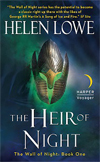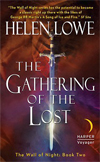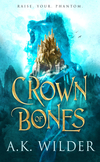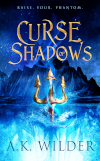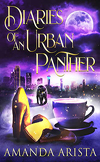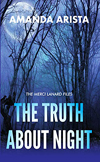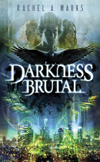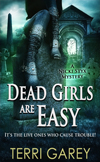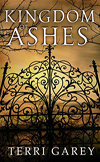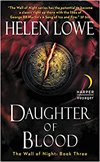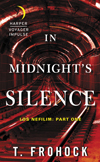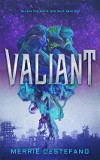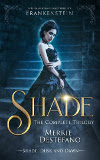For a long time, I've been intrigued by famous authors and their writing groups, like J.R.R. Tolkien, C.S. Lewis, and their group of Inklings. How did they meet one another, how often did they get together, what did they discuss? I wish I could listen in on one of their meetings, even though they took place years ago. But as much as the Inklings intrigued me, another group of writers captivated me even more.
This group shared a holiday in Lake Geneva, Switzerland in 1816, during a year that had no summer. A volcanic eruption caused snow to fall around the globe, so much that thousands froze to death in their beds—during the summer. In the midst of this, a group of brilliant minds felt their holiday was ruined by the horrible weather. They grew restless when they couldn't go outdoors and explore the nearby glaciers and castles. So, one of them challenged the others to write a ghost story. This group included Lord Byron, Percy Shelley, John Polidori, Claire Claremont and Mary Wollstonecraft Godwin (soon to Mary Shelley.)
As a result, a new genre of fiction was born: science fiction. Mary Godwin wrote Frankenstein. Meanwhile, John Polidori wrote the first vampire story ever, based on local legends—a story that would later inspire Bram Stoker to pen Dracula.
Imagine being there when everyone was writing new stories about horrible monsters.
Now imagine this: What if their stories were based on something that really happened? What if this new science that Mary and John were interested in—Galvanism—could really raise the dead? And what if the local legends of vampires were true and the foul weather drove these creatures down from the Alps, wild and hungry?
This was the basis for my new series, which begins with SHADE: A Re-imagining of Mary Shelley's Frankenstein. The first novella releases on May 1st and here are some early 5-star reviews:
"This is a nailbiting, teeth clenching, scream inducing, not blinking, afraid of the dark and anything moving in it read that hooked me from the start."—5-Star Amazon Review
"Merrie takes the reader on a Gothic horror thrill ride through Mary Wollstonecroft Godwin's eyes that ends in a heart-stopping cliffhanger. I can't wait to read the rest of the story!"—5-Star Amazon Review
"Shade hit the ground running from page 1. It is a truly disturbing gothic horror story with some romance thrown in for good measure."—5-Star Amazon Review
A short description of the book:
200 years ago, a young woman and a young man changed the world with their stories. They also fell in love. Then they had to kill the creature they raised from the dead to survive...
You can also read an excerpt here on my website.
What classic horror stories do you love? Comment below for a chance to win a free advance digital copy of SHADE: A RE-IMAGINING OF MARY SHELLEY'S FRANKENSTEIN. GIVEAWAY will end on Thursday, March 29th and will be announced on this blog post, so check back to see if you won!
Friday, March 23, 2018
Friday, March 16, 2018
Creative Instincts
by
Kim Falconer
| Avatar directed by James Cameron |
 |
| Perfecter and Innovator |
 |
| Perfecter |
1. Perfecter — An artist/writer who and maximizes what is, elevating it to the best it can be (think Bach, Mozart, Brahms, Spielberg, James Cameron, Stephen King, Tolkien, Pixar, Disney...)
 |
| Innovator |
 |
| Laini Taylor - Perfecter |
2. Innovator — An artist/writer who breaks the mold, pioneering a new style (as in Beethoven, Schoenberg, Kubrick, Picasso, Joyce, Dalí, Le Guin...)
3. Synthesizer — An artist/writer who draws from disparate sources, makes unexpected connections, to create something new (e.g. Ligeti, Stravinsky, David Lynch, Tarantino, Murakami, Adams...)
 |
| Perfecter & Synthesizer |
 |
| Synthesizer & Innovator |
It's interesting to think of the creative process this way, as an instinctual approach, and I suspect, after pouring through many films and titles, that writers are not one or the other. Like all things involving art, there is a certain blending.
Categorizing is also dependent on the times. Kill Bill was break-out in 2003. Kubrick's 2001: a Space Odyssey blew minds in 1968. And, back in 1870, Jules Verne altered the course of history with 20,000 Leagues Under the Sea. As said by FP Walter:
"... this book has been a source of fascination, surely one of the most influential novels ever written, an inspiration for such scientists and discoverers as engineer Simon Lake, oceanographer William Beebe, polar traveller Sir Ernest Shackleton. Likewise, Dr. Robert D. Ballard, finder of the sunken Titanic, confesses that this was his favourite book as a teenager, and Cousteau himself, most renowned of marine explorers, called it his shipboard bible."
 |
| Kim Wilkens as Synthesizer |
 |
| Neil Gaiman as Innovator |
Miéville identifies with the “New Weird” movement, a development of what used to be known as “science fantasy” – a blend of the occult and scientific speculation... The New Weird, at its best, combines the virtues of visionary fiction and horror fiction, political satire, literary fiction and even historical fiction
 Kim Falconer's latest release comes out in 2018 The Bone Throwers, book one in the Amassia series, writing as A K Wilder. Find her new page on Facebook - AKWilder Author and on Twitter as AKWilder.
Kim Falconer's latest release comes out in 2018 The Bone Throwers, book one in the Amassia series, writing as A K Wilder. Find her new page on Facebook - AKWilder Author and on Twitter as AKWilder.
Helen Lowe's Wall of Night series reads perfecter to me, elevating but also synthesizer with the feel of more contemporary themes and subtext.
When I think about my process writing the Quantum Enchantment Series, I relate most to Synthesizer. It's a been called Science Fantasty blend. With The Blood in the Beginning, I align more with Perfecter, taking what I love most about the Urban Fantasy genre and giving it new wings (or make that fins). My YA Fantasy, The Bone Throwers, out September 2018 under the pen name AK Wilder, if anything, it might be innovation. My instincts were to bring together a traditional coming of age with a premise never seen before. We'll see when the jury (the readers) verdict is in.
How about you? I'd love to hear from other Sup authors and readers about their process and their favorite creative works. Films? Books? Plays? What's blown your mind recently?
xxKim
 Kim Falconer's latest release comes out in 2018 The Bone Throwers, book one in the Amassia series, writing as A K Wilder. Find her new page on Facebook - AKWilder Author and on Twitter as AKWilder.
Kim Falconer's latest release comes out in 2018 The Bone Throwers, book one in the Amassia series, writing as A K Wilder. Find her new page on Facebook - AKWilder Author and on Twitter as AKWilder.
Her latest novel is out now - The Blood in the Beginning - and Ava Sykes Novel.
Learn more about Kim on Facebook and chat with her on Twitter. Check out her pen name, @a.k.wilder on Instagram, or visitAKWilder on FB and website.
Kim also runs GoodVibeAstrology.com where she teaches the law of attraction and astrology.
Kim posts here at the Supernatural Underground on the 16th of every month, hosts Save the Day Writer's Community on FB and posts a daily astrology weather report on Facebook.
Learn more about Kim on Facebook and chat with her on Twitter. Check out her pen name, @a.k.wilder on Instagram, or visitAKWilder on FB and website.
Kim also runs GoodVibeAstrology.com where she teaches the law of attraction and astrology.
Kim posts here at the Supernatural Underground on the 16th of every month, hosts Save the Day Writer's Community on FB and posts a daily astrology weather report on Facebook.
Monday, March 5, 2018
Know Thyself and thy brain wiring
by
Amanda Arista
Year of the New: Post-its here I come!
So in February, my new endeavor was to take a class. And I did. Write Better Faster with instructor R. L. Syme, was a whirlwind of personality tests and writing strategies that completely solidified why I do what I do and why some things work for my brain and some things don't.
The website says that "You will leave the class with an individualized set of strategies and tactics that will help you do your best work, be your most productive, and accomplish your writing goals." and they ain't lying. I had been exposed to multiple rounds of the Meyers-Briggs personality assessments before, but never through the lens of my career as a writer.
In case you were wondering what the brain of this writer looks:
Meyers Briggs- ENFP- Extroverted, Intuitive, Feeler, Perceiver
DISC- I/C&S- Influencer with moderate Compliance and Service
Strengthfinders- Strategic, Ideation, Connectedness, Relator, and Responsibility
The instructor helped us understand our personalities and strengths and what we can do to enhance those strengths and where we might go off the rails. For example, my strengths all have to do with big thoughts and feelings and I don't have a single detail-oriented bone in my body, which is why I can hammer out a fast draft and have to revise a million times to only keep finding mistakes. I like the emotions of the moment with the characters, but I really could care less what they are wearing so I have the tendency to write lots of dialogue and thinky-thoughts with no descriptions of place and setting.
Knowing really is half the battle and the instructor also did one-on-one strategy sessions with us to see what one thing I could do better in the coming months as well as some great things to do when I'm ready to edit again. Anyone want to beta read for me?
Big thing- Don't change everything at once!
 So the one strategy I am going to be working for March is to create a place in my house to have a focus board/plotting board, sort of like a vision board for a book. Since I can't plot out an entire book, because that just sucks out the fun part of exploring the story and then I'll never actually write the book because, BORING. A focus board will help me not get so distracted by away from the point of the story as well as keep me focused on theme and subplots without killing the action and feelings by having them all prescribed. Also, hopefully, to have a more complete story at the end of the first draft. You can read more about one here.
So the one strategy I am going to be working for March is to create a place in my house to have a focus board/plotting board, sort of like a vision board for a book. Since I can't plot out an entire book, because that just sucks out the fun part of exploring the story and then I'll never actually write the book because, BORING. A focus board will help me not get so distracted by away from the point of the story as well as keep me focused on theme and subplots without killing the action and feelings by having them all prescribed. Also, hopefully, to have a more complete story at the end of the first draft. You can read more about one here.
Turns out I am in a pre-writing stage for the next book, so its a perfect time to try something new. Post-its and poster board, HERE I COME!
As always, keep a look out for the hashtag #2018yearofthenew to see how I'm doing with my endeavors. And guys, you've got to keep me honest!
Carry on, dear readers.
Amanda Arista
@Pantherista
Author and ENFP
www.amandaarista.com
So in February, my new endeavor was to take a class. And I did. Write Better Faster with instructor R. L. Syme, was a whirlwind of personality tests and writing strategies that completely solidified why I do what I do and why some things work for my brain and some things don't.
The website says that "You will leave the class with an individualized set of strategies and tactics that will help you do your best work, be your most productive, and accomplish your writing goals." and they ain't lying. I had been exposed to multiple rounds of the Meyers-Briggs personality assessments before, but never through the lens of my career as a writer.
In case you were wondering what the brain of this writer looks:
Meyers Briggs- ENFP- Extroverted, Intuitive, Feeler, Perceiver
DISC- I/C&S- Influencer with moderate Compliance and Service
Strengthfinders- Strategic, Ideation, Connectedness, Relator, and Responsibility
The instructor helped us understand our personalities and strengths and what we can do to enhance those strengths and where we might go off the rails. For example, my strengths all have to do with big thoughts and feelings and I don't have a single detail-oriented bone in my body, which is why I can hammer out a fast draft and have to revise a million times to only keep finding mistakes. I like the emotions of the moment with the characters, but I really could care less what they are wearing so I have the tendency to write lots of dialogue and thinky-thoughts with no descriptions of place and setting.
Knowing really is half the battle and the instructor also did one-on-one strategy sessions with us to see what one thing I could do better in the coming months as well as some great things to do when I'm ready to edit again. Anyone want to beta read for me?
Big thing- Don't change everything at once!
 So the one strategy I am going to be working for March is to create a place in my house to have a focus board/plotting board, sort of like a vision board for a book. Since I can't plot out an entire book, because that just sucks out the fun part of exploring the story and then I'll never actually write the book because, BORING. A focus board will help me not get so distracted by away from the point of the story as well as keep me focused on theme and subplots without killing the action and feelings by having them all prescribed. Also, hopefully, to have a more complete story at the end of the first draft. You can read more about one here.
So the one strategy I am going to be working for March is to create a place in my house to have a focus board/plotting board, sort of like a vision board for a book. Since I can't plot out an entire book, because that just sucks out the fun part of exploring the story and then I'll never actually write the book because, BORING. A focus board will help me not get so distracted by away from the point of the story as well as keep me focused on theme and subplots without killing the action and feelings by having them all prescribed. Also, hopefully, to have a more complete story at the end of the first draft. You can read more about one here. Turns out I am in a pre-writing stage for the next book, so its a perfect time to try something new. Post-its and poster board, HERE I COME!
As always, keep a look out for the hashtag #2018yearofthenew to see how I'm doing with my endeavors. And guys, you've got to keep me honest!
Carry on, dear readers.
Amanda Arista
@Pantherista
Author and ENFP
www.amandaarista.com
Thursday, March 1, 2018
The Magic of Beginnings
by
Helen Lowe
Beginnings are magical. We all know it — and for those who still harbor doubts, I will only say: "New Year!", "weddings!", "baby showers!" Beginnings are magical and we love them!
And beginnings in books are no less magical than in real life. Strong beginnings — and endings — are essential to good story telling. Book beginnings are the vital opening lines that reach out and grab us, hauling us into full immersion in the world of the story.
 |
| Darcy & Elizabeth |
Well, we all know that one, right? Immediately, from the get-go, the Inimitable Jane captivates us with her sly irony — and executes a brilliant set-up for a story that has remained enduringly popular for two hundred years. (Two hundred years, fellow writers: two HUNDRED years!)
All of those two hundred-odd years later, here's another that definitely hooked me into the story:
" 'Heads Up!' A warning came through my earpiece as the door flew open. Two men, one average build, one overweight, tumbled past and hit the sidewalk, fists flying. The smell of sour beer and club music blasted out with them, the bass vibrating my bones. A few girls in short-shorts and sparkling tops squealed. The rest of the crowd cheered.
Typical midnight in Newton, Los Angeles."
– Kim Falconer, The Blood In The Beginning
These lines do indeed reach out and haul us into this action story: a great hook and scene-setting for an action-based paranormal story.
Sometimes, though, the beginning catches the reader's attention simply by its brevity:
"Call me Ishmael." – Hermann Melville, Moby Dick
This simple invitation from the narrator of Moby Dick is direct and personal. It both invites the reader in: no, it demands that the reader enter – and yet simultaneously repels, because the readers of Melville's time would have known that Ishmael was the Biblical outcast...
Here is another of my favorite, attention-grabbing, classical beginnings:
"Happy families are all alike; every unhappy family is unhappy in its own way."
– Leo Tolstoy, Anna Karenina
It's a beginning that gets you thinking and smiling wryly at the same time. It's also a beginning that tells you this will be a story about families, chiefly unhappy ones.
In a similar way, the beginning of The Gathering of the Lost (the second book in The Wall Of Night series) speaks to both what Robin Hobb has called the "strange magic" of the series but also its theme of darkness and concealed knowledge and events:
"Malian’s dream was darkness: blackness without stars, water without
light, a tower without a shadow that she remembered climbing—but
that too fell away as she plummeted, diving head first through the
dream."
These are just a few examples of both classic novels, and a few Supernatural Underground examples, that illustrate the magic of beginnings.
But how about you – do you have an all-time favorite book opening to share? Do tell me all about it!
PS: To read about endings, check out Kim's fab January post:
The End Is Near
~~~
Helen Lowe is a novelist, poet, interviewer and blogger whose first novel, Thornspell (Knopf), was published to critical praise in 2008. Her second, The Heir of Night (The Wall Of Night Series, Book One) won the Gemmell Morningstar Award 2012. The sequel, The Gathering Of The Lost, was shortlisted for the Gemmell Legend Award in 2013. Daughter Of Blood, (The Wall Of Night, Book Three) is her most recent book and she is currently working on the fourth and final novel in The Wall Of Night series. Helen posts regularly on her “…on Anything, Really” blog and is also on Twitter: @helenl0we
Subscribe to:
Comments (Atom)












